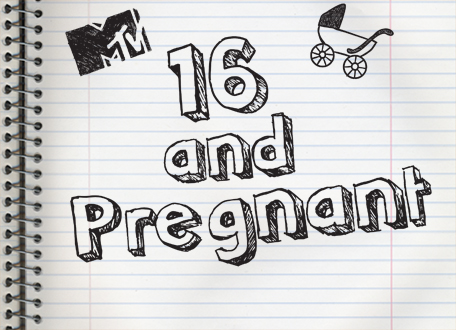Parenting Teenage Style
 It’s not like me to leave new episodes of MTV’s 16 and Pregnant languishing on my DVR, especially the first two episodes of a new season. What can I say? April is the cruelest month. Viewing the first two episodes of season 3 back-to-back, though, brought into focus the conflicting definitions of home that are central to the show’s portrayal of gendered parenthood. The show follows teen parents from mid-pregnancy to the early days after their baby’s (or, in the case of the couple expecting twin boys on the April 26 episode, babies’) birth. Without homes of their own to settle into as fledgling family units, the parents sometimes take up residence together in one of their childhood homes. Sometimes, they take turns living with each other’s own caregivers, and sometimes, they live separately, sharing—or not—parenting duties. The April 19 season premiere focused on a teen mom, Jordan, struggling to deal with the isolation she felt as her son’s main caregiver. In contrast, Jennifer appeared on April 26 and worried about negotiating a safe place to take care of her sons.
It’s not like me to leave new episodes of MTV’s 16 and Pregnant languishing on my DVR, especially the first two episodes of a new season. What can I say? April is the cruelest month. Viewing the first two episodes of season 3 back-to-back, though, brought into focus the conflicting definitions of home that are central to the show’s portrayal of gendered parenthood. The show follows teen parents from mid-pregnancy to the early days after their baby’s (or, in the case of the couple expecting twin boys on the April 26 episode, babies’) birth. Without homes of their own to settle into as fledgling family units, the parents sometimes take up residence together in one of their childhood homes. Sometimes, they take turns living with each other’s own caregivers, and sometimes, they live separately, sharing—or not—parenting duties. The April 19 season premiere focused on a teen mom, Jordan, struggling to deal with the isolation she felt as her son’s main caregiver. In contrast, Jennifer appeared on April 26 and worried about negotiating a safe place to take care of her sons.
In its fashioning of teens into parents, 16 and Pregnant tells its stars’ stories along stereotypical gender lines. Mary Beltrán has blogged about MTV’s spin-off teen-parenting show Teen Mom, writing that the show glosses over important race and class dynamics in its attempts to neatly package teen parenting. This is certainly true of 16 and Pregnant which shows class disparities but does not dwell on them, features a predominately white cast, and delivers its after-school-special style messages about safe sex and dating violence at key moments in its carefully edited, glossy narrative. In addition, 16 and Pregnant shapes its teen drama into the dad-goes-to-work-and-mom-stays-home story held aloft as symbolic of the American dream. At the same time, the show’s moms and dads openly question this narrative, making 16 and Pregnant a clear lens through which to view the changing role of fathers in our culture and the emerging ways mothers negotiate choice and childrearing.
Since the 1970s, a particular ideology has governed parenting practices and policies in the U.S. This ideology can be dubbed “the ideology of intensive mothering,” a term coined by sociologist Sharon Hays in her 1998 book The Cultural Contradictions of Motherhood. Intensive mothering argues that the intense, time-consuming, and expensive work of parenting must be valued above the market and performed in the home by a parent (mother). The unspoken assumption is, of course, that this carework is supported by the paid labor of another parent (father). Jordan cried to the camera after her son came home from the hospital that her boyfriend’s constant fleeing of her grandmother’s home to go to school and work made her feel alone, and her struggle with the isolation of stay-at-home motherhood called into question the principles of this ideology. Jennifer, by contrast, found a safe haven in her parents’ house. When she abandoned at-home parenting, she found herself and her sons abandoned roadside, expelled from her boyfriend’s speeding car, rescued by her own mother whose large, red minivan skidding to the highway’s edge became a symbol of Jennifer’s domestic salvation.
Season 3’s first 2 episodes brought up other topics that are sure to appear again as more teens debut: birth control discourse, infant feeding debates, teen sexuality, contested notions of fatherhood, mothers’ freedom to move between home and the outside world. 16 and Pregnant gives us glimpses of teens trying to negotiate parenthood as their very roles are changing, as parenting ideologies unquestioned for decades are renegotiated in larger social conversations, and as our appetite for reality rags-to-riches stories grows sharper with every spin-off.


